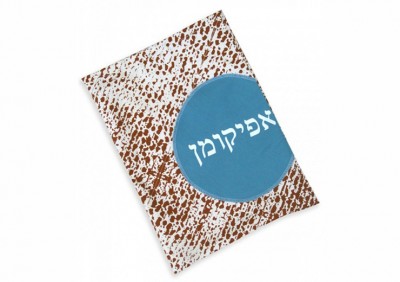
The Afikoman is eaten right before Birkat Hamazon at the Seder, and is the last food eaten at the Seder. The Shulchan Aruch rules that one must eat at least one Ke’zayit of Matzah to fulfill the obligation of Afikoman. Some, however, have the practice of eating at least two Kezetim of Matzah for the Afikoman. The Afikoman is eaten in commemoration of the Korban Pesach, and in the times of the Bet Hamikdash the meat of the Korban Pesach was eaten together with Matzah. Therefore, some authorities maintained that one must eat one Ke’zayit of Matzah to commemorate the sacrificial meat, and another Ke’zayit to commemorate the Matzah that was eaten along with the meat of the sacrifice. Therefore, if one is able to eat two Kezeitim for the Afikoman, it is proper to do so in order to fulfill all opinions. However, if a person feels very full and cannot eat more than one Ke’zayit, he should eat only one Ke’zayit and he thereby fulfills the Mitzvah, in accordance with the ruling of the Shulchan Aruch. It thus emerges that a person must eat a total of four or five Kezetim of Matzah at the Seder: two for "Motzi Matzah," one for Korech, and one or two for the Afikoman. Invariably, the Matzah that had been put away for the Afikoman before Maggid will not suffice to supply a Ke’zayit (or two Kezetim) for everyone at the Seder. Therefore, one should take Matzah from the box at the table so he could fulfill the Mitzvah properly. The one leading the Seder should ensure that there is enough Matzah for everyone to receive one Ke’zayit for Afikoman, or two Kezetim for those who wish to follow the stringent position. The Ke’zayit of the Afikoman should be eaten within a period of four minutes, or at most within seven minutes. One must eat the Afikoman while leaning ("Heseba"). If one ate the Afikoman without leaning, he should eat another Ke’zayit while leaning. If, however, he feels too full and eating more Matzah would constitute "Achila Gasa" (vulgar overeating), then he may rely on the view which does not require leaning for the Afikoman. Both men and women are required to eat the Afikoman, with "Heseba." In the Haggadah we read the famous Halacha of "En Maftirin Ahar Ha’pesah Afikoman," which means that one may not eat anything after he eats the Afikoman. Dessert should be served before the Afikoman, and not afterward. It is also forbidden to drink after eating the Afikoman, with the obvious exception of the remaining two cups of wine, which are drunk after Birkat Hamazon and after Hallel. Furthermore, it is permissible to drink water after the Afikoman, and one who wishes to stay up after the Seder to learn or sing may drink some tea or coffee to help him stay awake.
By Rabbi Eli Mansour
Eating The Afikoman on Pesach Night
Typography
- Smaller Small Medium Big Bigger
- Default Helvetica Segoe Georgia Times
- Reading Mode




